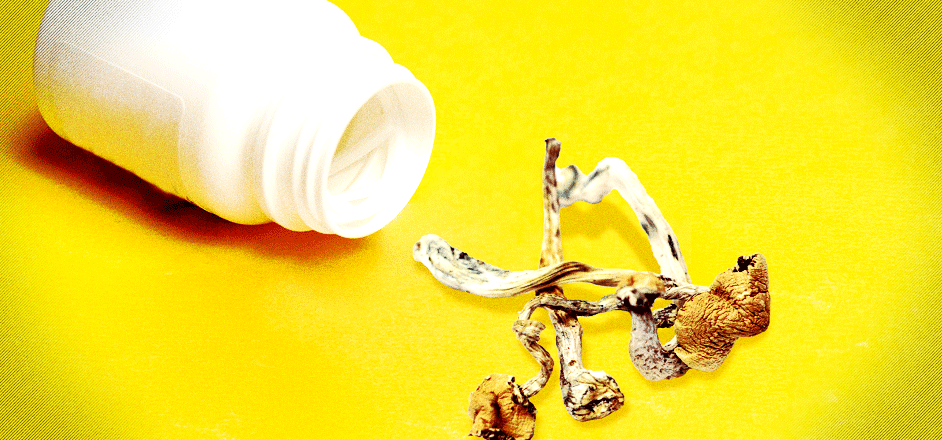MDMA, LSD, and psilocybin are currently undergoing clinical trials. If the trials prove successful, we’ll soon be seeing these so-called “street drugs” in therapists’ offices around the country, possibly around the developed world, too. What will these treatments look like, and more importantly, how can you score some?
Well, I’m here to tell you that you may be out of luck, whether your thrill of choice is MDMA, LSD, or psilocybin.
You Can Only Get It at the Office
If you’re planning on snagging some magic-shroom dust from your dorm homie, or pocketing a couple of pharmie-grade molly pills from your parents’ medicine cabinet – that ain’t gonna happen.
Dr. Marcela Ot’alora leads one of the largest MDMA-assisted psychotherapy research groups in the U.S. In an email, she told Rooster that the general public won’t have easy access to the drug.
“As a prescription for PTSD,” Ot’alora wrote, “MDMA will not be a medicine that you can get at your local pharmacy.”
Instead, the therapist will administer a single dose – and only a single dose – for a single talk therapy session. The patient will take the MDMA, LSD, or psilocybin prior to the session, and that’s it. No month supply bottle, no surplus to stow away for a rainy day.
Your Entire High Will Be Spent in the Office
LSD, psilocybin, and MDMA are known for generating long-lasting heady experiences, sometimes peaking for a solid six to nine hours. Since most talk therapies only last an hour or two, that means you can probably just scoot off to that Friday night rager right after you get lit at the clinic, right?
Again, not so fast.
Dr. George Greer is the president of the Heffter Research Institute, a medical research group that’s experimenting with psilocybin-assisted psychotherapy. In an email, he explained that, unlike MDMA-assisted therapy, a patient won’t engage in talk therapy once the psilocybin kicks in.
“The dose is high enough to make it difficult to participate in coherent dialogue,” he wrote. “But there is a lot of talk therapy before and after, including at the end of the session day after the psilocybin has mostly worn off.”
In other words, while you’re tripping balls, you’ll be chilling at the clinic, not in your bedroom under the multicolored bubble projector. Then you’ll have to stay after coming down so you can tell your therapist all about the tsunami of epiphanies you encountered.
You’ll Probably Have to Spend the Night – at the Office
Even if you wanted to skip out of, or escape from, the clinic before your designated time, it’s unlikely.
Only one doctor can currently dole out LSD to his patients, and that doctor is Switzerland’s Peter Gasser. In 2014, he coauthored a paper with researchers from MAPS, detailing how he conducted his LSD-assisted sessions. In every case, the only party the patient could expect was a slumber party.
Gasser wrote, “Other than going to the bathroom, the participants remained in the treatment room for the entire 8-hour experimental session and overnight with an attendant nearby.”
Not exactly the kind of slumber party with pillow fights, either, unless the nearby attendant happened to be feeling especially frisky.
Overnight stays at the clinic are required with MDMA as well. Ot’alora mentioned that, like with Gasser’s LSD treatments, “participants spend the night at the site with a night attendant” after taking MDMA. Until the drug completely wears off, the subject doesn’t leave.
Taxis and ridesharing services are also out of the question, since laws prevent them from picking up intoxicated patients.
The Goal is Treatment, Not Treats
If all of this sounds like a bummer, that’s the point. Although the FDA wouldn’t comment on how these drugs would be dished out, the researchers who’ve actually been working with these compounds said the strict controls were intentional. They don’t want Chad McLightweight abusing these drugs, especially outside of a monitored, controlled setting.
Will it always be this way? No one can say for sure. In the 1990s, when medical cannabis became law in California, only patients dying of AIDS or cancer could legally access weed. Two decades later, anyone over 21 can buy or grow weed in Cali, healthy or sick.
Regardless, it’s not fair to call legit medicine “boring.” Making progress on mental health and overcoming trauma could hardly be described as dull. But until group sessions, play therapy, and custom Pandora playlists become acceptable aspects of psychedelic treatments, the process will feel clinical, and, for some debaucherous individuals, sterile, even.



Leave a Reply